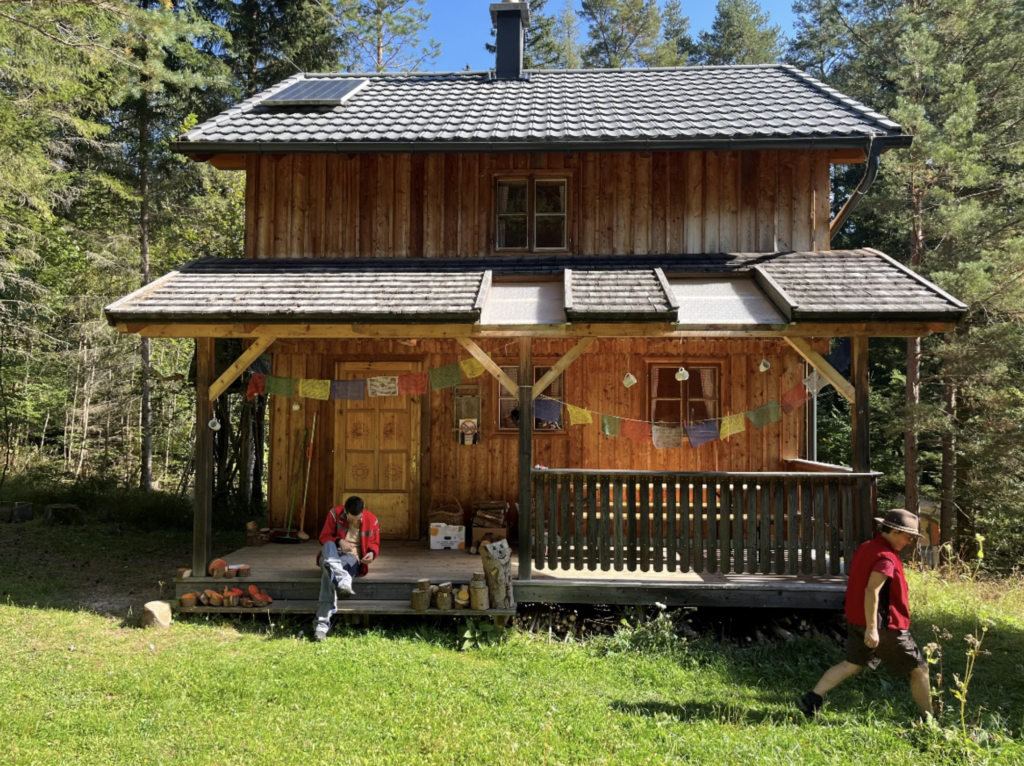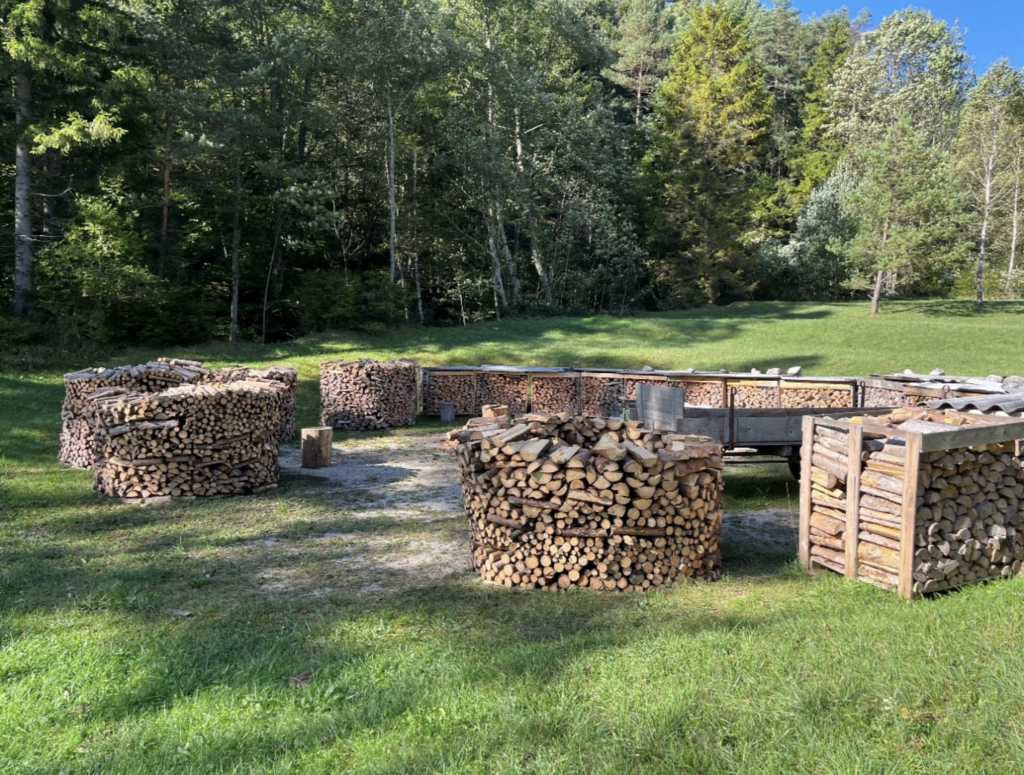By Somaye Latifi, Ingrid Machold and Georg Wiesinger (Federal Institute of Agricultural Economics, Rural and Mountain Research (BAB), Vienna)
Given the many potentials and challenges of mountainous areas, diversifying sources of income through Green Care can present sustainable opportunities for marginalised mountain communities. In Austria, expanding product portfolios in the agricultural and forestry sectors is a viable strategy of agricultural and forestry enterprises and smallholders to ensure economic sustainability.
To overcome the periphery traps of marginalised mountainous areas such as outmigration, stagnating employability, or land abandonment, seeking innovative livelihood options and sustainable income strategies in marginalised mountain communities should lie at the centre of efforts. Smallholders and forest owners increasingly view Green Care as one such diversification pathway.
What is Green Care?
The concept of Green Care originated from the framework of the European Cooperation COST Action 866: Green Care in Agriculture (Dessein and Bock, 2010; Sempik et al., 2010; Wiesinger, 2011). Green Care encompasses nature-based activities designed to promote health, well-being, and overall quality of life. This concept integrates caring for both people and the land by linking three previously separated elements: (1) multifunctional agriculture and diverse agricultural values, (2) social services and healthcare, and (3) the farming sector and local communities.
Green Care involves a wide range of activities and interventions that take place in natural settings, such as farms, gardens, or other natural environments. These activities can benefit local initiatives and organisations as they provide services including nature-based and farm-based kindergartens, pedagogical arrangements for schools, special education arrangements, labour market initiatives, services for people with mental, physical, or drug-related issues, or services for elderly people and people with dementia (Steigen et al., 2016).
The Economic and Social Benefits of Green Care Initiatives in Revitalising Marginalised Mountainous Communities
Family farming is the main type of land use in mountainous regions (Kohler et al., 2013). Because of their close relation to nature and focus on animal breeding and traditional farm management, mountain farms are ideal locations for implementing Green Care activities. By encouraging community-based entrepreneurship, Green Care initiatives leverage local natural resources for diversification and economic growth in mountainous communities. The services offered by Green Care farms may also reduce risks associated with excessive reliance on natural resources by creating new income opportunities and innovative diversification strategies.
In addition to these economic benefits, integrating individuals into farming activities offers a structured environment for rehabilitation, skill development, and social interaction. Green Care initiatives provide opportunities for vulnerable and marginalised groups, including elderly persons, those with disabilities, those suffering from drug addiction, or traumatised people, to engage in meaningful agricultural and forestry work for social integration and personal development. These activities can be combined with educational programmes that use natural environments to teach various subjects and foster environmental awareness and conservation behaviours. They are designed to harness the therapeutic and educational potential of nature and agriculture to improve mental health, enhance social integration, provide learning opportunities, and promote overall well-being.
By building individual and community capacity through training and education, Green Care activities lastly also promote a sense of ownership and responsibility for the local environment. Collaborations with varied stakeholders, including local communities, NGOs, and businesses, enhance the support system for marginalised areas, bringing in resources, expertise, and opportunities for long-term sustainable growth. This reliance on networks and cooperation may increase social cohesion within a community, support people with various handicaps in their recovery, and improve social services and human–nature relationships.
Green Care in Austria
Mountain farming has great regional, social, and economic significance in Austria, as more than half of agricultural and forestry holdings operate in these areas and substantially contribute to their preservation and care. This work also provides the foundation for the Austrian tourism industry, which generates an essential share of Austria’s gross domestic product.
The Green Care initiative was launched in Austria by the Vienna Chamber of Agriculture in 2011 and was later joined by other local agricultural chambers. The former Austrian Ministry of Agriculture, Forestry, Regions, and Water Management encouraged the initiative “Green Care Forest” as a platform offering “interested forest owners an opportunity to open up their forests to persons seeking recreation.” A recent study conducted by the Austrian Institute of Economic Research (WIFO) continues to show that Green Care initiatives can be a vital means of diversifying the income of smallholders and small-scale forest owners and plays a crucial role by creating jobs and improving the quality of life in rural regions (Famira-Mühlberger et al., 2021).
The Austrian government has actively supported the establishment of Green Care initiatives through the Rural Development Programme 2014-2020. These initiatives align with a growing public interest in Green Care, representing a positive reception and potential for further development, and have been recently investigated by an Erasmus+ Project “GreenForCare.”
Today, Green Care in Austria functions based on a unique certification system to ensure quality and security in all types of Green Care farms and properly contribute to both the local economy and the overall quality of life in Austria’s rural and mountain regions.
An Example of Green Care in an Austrian Marginalised Mountain Area
Schwarzau im Gebirge is a mountainous municipality in Lower Austria and is geographically isolated compared to most other municipalities in the district. Schwarzau im Gebirge relies on forestry as a main income source, whereas tourism does not play any significant role. This municipality faces challenges like economic dependency on a single sector, limited opportunities for economic diversification, an aging population, and lack of access to essential services. Over the past 150 years, the population in this municipality has decreased by more than 60%. The limited number of high-quality jobs for skilled individuals is one of the main problems in this region (Wiesinger, 2007), forcing young people to leave the region for better opportunities.
The Silbersberg Association, established in 1992, is a non-profit and independent organisation in Schwarzau im Gebirge dedicated to supporting disabled and/or marginalised individuals. Through an agreement with the state of Lower Austria, the Silbersberg Association focuses on “researching the abilities of disabled people” and “providing educational influence” via accommodation and care. Its main objective is to enhance the quality of life of disabled individuals by creating a shared living space for both disabled and non-disabled people. It offers shelter, agricultural and forestry activities, short-term care, and recreation. Currently, 35 employees collaborate with 32 disabled individuals across several houses in Gloggnitz and a farm in Schwarzau im Gebirge.

The Silbersberg Association is inherently classified as a Green Care initiative as it provides social support and care and uses agricultural and forestry activities in its operations to offer health, social, and rehabilitation support. Its activities also have a strong impact on the local community. Supporting people with disabilities and creating co-living spaces, workshops, and farming initiatives not only contributes to the well-being of those affected, but also stimulates the local economy and strengthens a sense of community participation. It lastly provides opportunities for employment and collaboration, affecting the social dynamics of the region and supporting the revitalisation of this marginalised mountain community.

In general, involving local communities in the planning and implementation of Green Care initiatives is vital to ensuring that they align with the cultural and environmental context of mountain areas. Creating awareness and building capacity within communities is equally crucial for the success of these initiatives. While Green Care can be a valuable component of a comprehensive strategy to tackle periphery traps, it’s important to complement it with other initiatives such as infrastructure development, education, and regional planning. Together, these efforts can contribute to the revitalisation and sustainable development of marginalised mountain areas.
The header image depicts Quellenhof, Schwarzau in Gebirge, Austria (© Astrid Reitter)
References
Dessein, J. and Bock, B.B. (Eds.) (2010). The Economics of Green Care in Agriculture. COST Action 866, Green Care in Agriculture. Loughborough: Loughborough University. https://edepot.wur.nl/163495
Famira-Mühlberger, U., Sinabell, F., Streicher, G. and Sterkl, T. (2021). Green Care in Österreich, Regionalwirtschaftliche Bedeutung und Zukunftsperspektiven. Wien: Österreichisches Institut für Wirtschaftsforschung (WIFO). https://www.wifo.ac.at/jart/prj3/wifo/resources/person_dokument/person_dokument.jart?publikationsid=67023&mime_type=application/pdf
García-Llorente, M., Rubio-Olivar, R. and Gutierrez-Briceño, I. (2018). Farming for life Quality and sustainability: A literature review of green care research trends in Europe. International Journal of Environmental Research and Public Health 15(6):1-18. dio:10.3390/ijerph15061282 https://www.mdpi.com/1660-4601/15/6/1282
Hoffmann, C. and Streifeneder, T. (2013). Social agriculture as part of green care. In: S. Wymann von Dach, R. Romeo, A. Vita, M. Wurzinger and T. Kohler (Eds.). Mountain Farming is Family Farming: A contribution from mountain areas to the International Year of Family Farming 2014, pp. 80-81. Rome, Italy: FAO, CDE, BOKU. https://core.ac.uk/download/pdf/33072305.pdf
Kohler, T., Romeo, R., Vita, A., Wurzinger, M. and Wymann von Dach, S. (2013). The future of family farming in mountains: policy messages. In: S. Wymann von Dach, R. Romeo, A. Vita, M. Wurzinger and T. Kohler (Eds.). Mountain Farming is Family Farming: A contribution from mountain areas to the International Year of Family Farming 2014, pp. 86-87. Rome, Italy: FAO, CDE, BOKU. https://core.ac.uk/download/pdf/33072305.pdf
Sempik, J., Hine, R. and Wilcox, D. (2010). Green Care: A conceptual framework. A Report of the working group on the health benefits of Green Care, COST Action 866, Green Care in Agriculture. Loughborough: Centre for Child and Family Research, Loughborough University. http://www.umb.no/statisk/greencare/green_carea_conceptual_framework.pdf
Steigen, A.M., Kogstad, R. and Hummelvoll, J. K. (2016). Green Care services in the Nordic countries: an integrative literature review. European Journal of Social Work 19 (5): 692-715. doi:10.1080/13691457.2015.1082983 https://www.tandfonline.com/doi/full/10.1080/13691457.2015.1082983
Wiesinger, G. (2007). The importance of social capital in rural development, networking and decision-making in rural areas. Journal of Alpine Research 95-4: 43-56. doi:10.4000/rga.354 https://journals.openedition.org/rga/354
Wiesinger, G. (Ed.) (2011), Green Care in Landwirtschaft und Gartenbau. Resumee der COST Aktion 866 Green Care in Agriculture. Wien: Bundesanstalt für Bergbauernfragen. https://bab.gv.at/index.php?option=com_content&view=article&id=1569:ff49-green-care-in-landwirtschaft-und-gartenbau&catid=135&lang=de&Itemid=419


